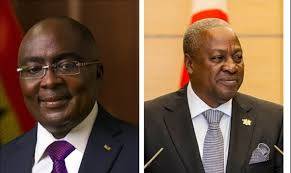In the dynamic landscape of Ghanaian politics, a recent statement by President Nana Akufo-Addo has reignited discussions surrounding the leadership and governance of the nation. During a recent address, he asserted that former President John Mahama had failed in his presidency and urged Ghanaians to provide the current Vice President, Dr. Mahamudu Bawumia, with an opportunity to lead the nation forward. This statement has sparked debates among the electorate about the efficacy of both leaders and the prospects of the nation under Bawumia's potential leadership.
Akufo-Addo's remarks come at a time when the nation is grappling with various socio-economic challenges. He emphasized that Mahama’s tenure from 2012 to 2016 was marked by a series of failures, particularly in the areas of infrastructure development, corruption management, and economic stability. Many Ghanaian citizens recall the infamous "dumsor" crisis during Mahama's administration, which saw widespread power outages that disrupted daily life and economic activities. Additionally, accusations of corruption and mismanagement further marred Mahama's reputation, leading many to perceive his presidency as ineffective.
In contrast, Akufo-Addo positioned Bawumia, who is also the current Vice President, as a capable leader with a strong academic background and experience in economic management. Bawumia's tenure has been marked by his involvement in various developmental projects and initiatives aimed at enhancing digital transformation and financial inclusion within the country. The emphasis on technological advancement has been a cornerstone of the current administration’s agenda, making the nation more competitive and potentially resilient in an increasingly globalized world.
Supporters of Bawumia argue that his experience and qualifications provide a solid foundation for leadership, especially as Ghana faces growing economic challenges that necessitate innovative solutions. Under Bawumia's guidance, many believe that policies could be enacted to confront issues such as unemployment, inflation, and fiscal deficits, thereby restoring public confidence in governance. The current administration’s efforts to digitize public services and promote entrepreneurship are lauded as steps in the right direction to foster economic recovery and growth.
However, the question of Bawumia’s capability to deliver results is subject to scrutiny. Critics argue that he has been part of the current administration, and, therefore, shares in both the successes and failures of Akufo-Addo’s governance. Some citizens remain skeptical about whether a transition from the Akufo-Addo administration to Bawumia would yield the positive changes that Ghanaians are yearning for.
The outcome of Ghana's political future rests not only on the credibility and vision of its leaders but also on the electorate's ability to critically assess their past performances. As Ghanaians look ahead to the upcoming elections, the call from President Akufo-Addo for the public to give Bawumia a chance will undoubtedly influence the discourse on leadership and governance.
In conclusion, while President Akufo-Addo's criticism of Mahama resonates with many who felt let down by the previous administration, the path forward is multifaceted. Ghanaians will need to weigh the implications of continuing with the current leadership structure against the promise of new directions under Bawumia. Ultimately, it is the citizens who will determine whether they are ready to embrace change or seek alternatives that lie beyond the current political landscape.



